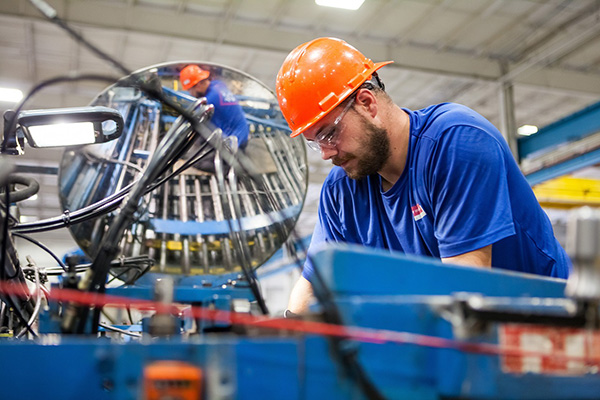First introduced in the 80’s, Manufacturing Execution Systems are transforming diverse manufacturing sectors.
It is easy to dismiss Manufacturing Execution Systems (MES) as antiquated. The concept was first introduced in the 1980’s, and some modern businesses have rejected MES as ‘not fit for purpose’. This not only represents a profound misunderstanding—it also misrepresents the vitality and indispensability of industries themselves.
Far from becoming irrelevant, MES have not just persisted but flourished. They are catalyzing transformative changes across diverse manufacturing sectors. For example: MES have streamlined assembly lines and accelerated the time to market for automotive manufacturers, ensured compliance with regulatory standards for pharmaceutical companies and enhanced visibility into production and safety for the oil and gas industry. In a nutshell, not only can MES safeguard product quality, but they can also shorten time to market and increase the efficiency of the product process.
For starters, the dawn of the Intelligent Industry has magnified the importance of MES. This fourth wave of the industrial revolution, defined by its interconnectedness and digital integration, demands systems that can not only withstand the pressures of change, but thrive amongst them. MES have effortlessly grown into this role and integrated seamlessly within the tenets of Intelligent Industry. They have matured into an all-encompassing system capable of enabling an Intelligent Industry approach.
MES are thriving, providing the backbone needed for manufacturing companies to successfully navigate the modern era. With digital transformation becoming more of a necessity than an option, the role of MES in these transformed manufacturing landscapes is only set to grow, marking an era of continued dominance and relevance.
This transformation, combined with the convergence of the physical and digital worlds is revolutionizing industries. Thanks to a plethora of devices and sensors, physical objects – from light bulbs to cars – are being connected and are entering the digital realm. MES have emerged as a fundamental pillar in this rapidly evolving landscape to bridge the ‘legacy’ physical world to the digital space of the future. By integrating the Internet of Things (IoT), AI-driven analytics and connectivity, MES have made complex manufacturing processes future-proof and boosted efficiency.
The role of MES extends far beyond just enabling efficiency and agility. They are the very foundation upon which smart factories are built. The advent of smart factories, which have highly digitized and connected production facilities, has been largely powered by the capabilities of MES. By integrating machines, systems, and personnel, these systems foster an environment conducive to real-time collaboration, predictive maintenance, and intelligent decision-making.
In the smart factory ecosystem, MES are the backbone, connecting and coordinating the various components of the manufacturing process. They allow for the seamless exchange of information and the synchronization of actions, thus enabling a higher degree of automation and innovation. As smart factories become the new norm, the role of MES as the core of these operations becomes increasingly important.
MES are also integral to creating eco-friendly smart factories. They can optimize resources, identify and cut waste, and gather real-time data to minimize emissions. With their unparalleled ability to streamline manufacturing processes, MES are not just enabling the present—they are shaping the future of manufacturing and helping businesses enhance their sustainability and environmental responsibilities.

Emerging technologies such as artificial intelligence (AI), machine learning (ML), and robotics can give MES a new lease on life. The convergence of traditional manufacturing processes and state-of-the-art technology can ensure that MES, and consequently the enterprises deploying them, stay relevant and remain at the cutting edge of technological advancement.
Enterprises integrating AI with MES can benefit from predictive analytics, enhanced decision-making, and advanced automation to optimize manufacturing processes and output. With the incorporation of machine learning, MES systems can learn and adapt their operations in real time, thereby enhancing efficiency and reducing downtime. In the realm of robotics, MES orchestrate precise, automated tasks that reduce human error and improve safety and productivity.
MES are not just surviving but thriving in the contemporary manufacturing landscape – and these systems have been reinvigorated by the growth of Intelligent Industry. With the integration of new technology, these systems allow manufacturers to stay at the forefront of innovation, providing the capabilities to navigate the challenges of modern manufacturing and capitalize on the opportunities from digital transformation.
The ability of MES to adapt, integrate, and evolve with emerging technologies reinforces its crucial role in the future of the manufacturing sector. That is why MES are far from slipping into irrelevance.
Christophe Vidal is VP – Head of Digital Manufacturing & Operations at Capgemini Engineering.
Scott Ellyson, CEO of East West Manufacturing, brings decades of global manufacturing and supply chain leadership to the conversation. In this episode, he shares practical insights on scaling operations, navigating complexity, and building resilient manufacturing networks in an increasingly connected world.